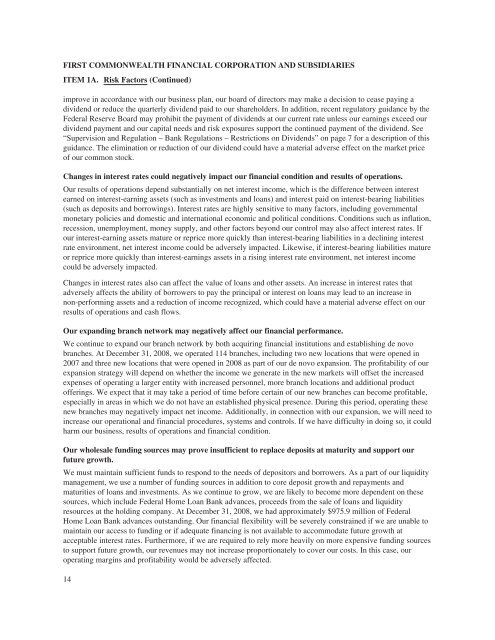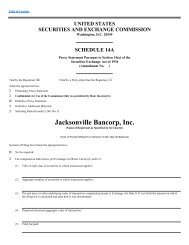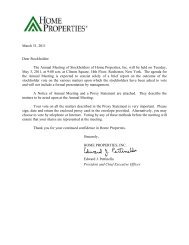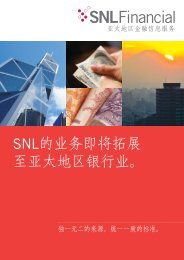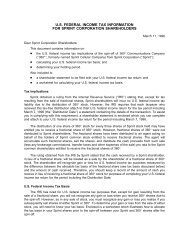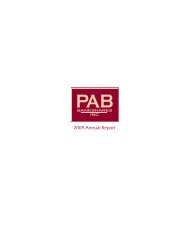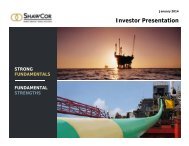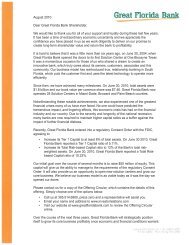Strength and Stability - SNL Financial
Strength and Stability - SNL Financial
Strength and Stability - SNL Financial
You also want an ePaper? Increase the reach of your titles
YUMPU automatically turns print PDFs into web optimized ePapers that Google loves.
FIRST COMMONWEALTH FINANCIAL CORPORATION AND SUBSIDIARIES<br />
ITEM 1A. Risk Factors (Continued)<br />
improve in accordance with our business plan, our board of directors may make a decision to cease paying a<br />
dividend or reduce the quarterly dividend paid to our shareholders. In addition, recent regulatory guidance by the<br />
Federal Reserve Board may prohibit the payment of dividends at our current rate unless our earnings exceed our<br />
dividend payment <strong>and</strong> our capital needs <strong>and</strong> risk exposures support the continued payment of the dividend. See<br />
“Supervision <strong>and</strong> Regulation – Bank Regulations – Restrictions on Dividends” on page 7 for a description of this<br />
guidance. The elimination or reduction of our dividend could have a material adverse effect on the market price<br />
of our common stock.<br />
Changes in interest rates could negatively impact our financial condition <strong>and</strong> results of operations.<br />
Our results of operations depend substantially on net interest income, which is the difference between interest<br />
earned on interest-earning assets (such as investments <strong>and</strong> loans) <strong>and</strong> interest paid on interest-bearing liabilities<br />
(such as deposits <strong>and</strong> borrowings). Interest rates are highly sensitive to many factors, including governmental<br />
monetary policies <strong>and</strong> domestic <strong>and</strong> international economic <strong>and</strong> political conditions. Conditions such as inflation,<br />
recession, unemployment, money supply, <strong>and</strong> other factors beyond our control may also affect interest rates. If<br />
our interest-earning assets mature or reprice more quickly than interest-bearing liabilities in a declining interest<br />
rate environment, net interest income could be adversely impacted. Likewise, if interest-bearing liabilities mature<br />
or reprice more quickly than interest-earnings assets in a rising interest rate environment, net interest income<br />
could be adversely impacted.<br />
Changes in interest rates also can affect the value of loans <strong>and</strong> other assets. An increase in interest rates that<br />
adversely affects the ability of borrowers to pay the principal or interest on loans may lead to an increase in<br />
non-performing assets <strong>and</strong> a reduction of income recognized, which could have a material adverse effect on our<br />
results of operations <strong>and</strong> cash flows.<br />
Our exp<strong>and</strong>ing branch network may negatively affect our financial performance.<br />
We continue to exp<strong>and</strong> our branch network by both acquiring financial institutions <strong>and</strong> establishing de novo<br />
branches. At December 31, 2008, we operated 114 branches, including two new locations that were opened in<br />
2007 <strong>and</strong> three new locations that were opened in 2008 as part of our de novo expansion. The profitability of our<br />
expansion strategy will depend on whether the income we generate in the new markets will offset the increased<br />
expenses of operating a larger entity with increased personnel, more branch locations <strong>and</strong> additional product<br />
offerings. We expect that it may take a period of time before certain of our new branches can become profitable,<br />
especially in areas in which we do not have an established physical presence. During this period, operating these<br />
new branches may negatively impact net income. Additionally, in connection with our expansion, we will need to<br />
increase our operational <strong>and</strong> financial procedures, systems <strong>and</strong> controls. If we have difficulty in doing so, it could<br />
harm our business, results of operations <strong>and</strong> financial condition.<br />
Our wholesale funding sources may prove insufficient to replace deposits at maturity <strong>and</strong> support our<br />
future growth.<br />
We must maintain sufficient funds to respond to the needs of depositors <strong>and</strong> borrowers. As a part of our liquidity<br />
management, we use a number of funding sources in addition to core deposit growth <strong>and</strong> repayments <strong>and</strong><br />
maturities of loans <strong>and</strong> investments. As we continue to grow, we are likely to become more dependent on these<br />
sources, which include Federal Home Loan Bank advances, proceeds from the sale of loans <strong>and</strong> liquidity<br />
resources at the holding company. At December 31, 2008, we had approximately $975.9 million of Federal<br />
Home Loan Bank advances outst<strong>and</strong>ing. Our financial flexibility will be severely constrained if we are unable to<br />
maintain our access to funding or if adequate financing is not available to accommodate future growth at<br />
acceptable interest rates. Furthermore, if we are required to rely more heavily on more expensive funding sources<br />
to support future growth, our revenues may not increase proportionately to cover our costs. In this case, our<br />
operating margins <strong>and</strong> profitability would be adversely affected.<br />
14


